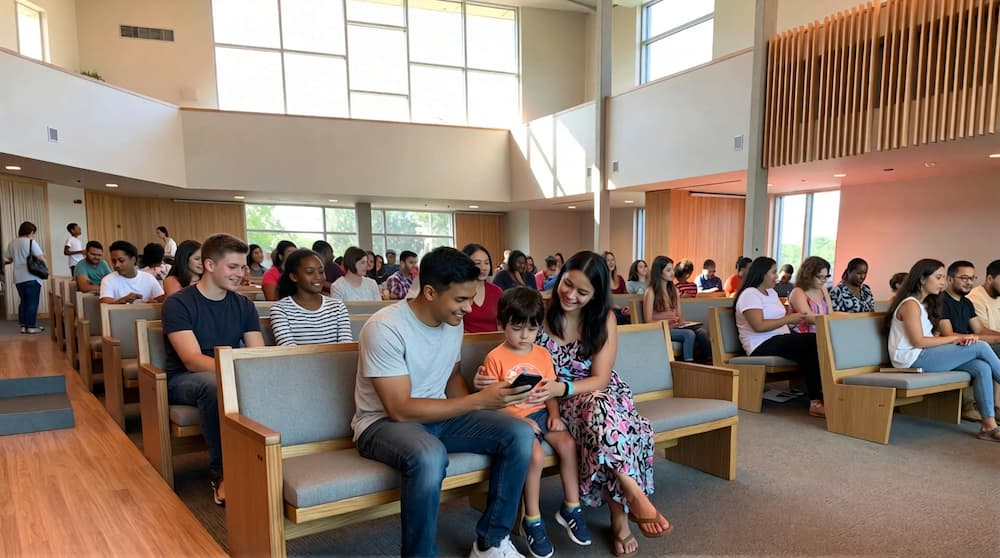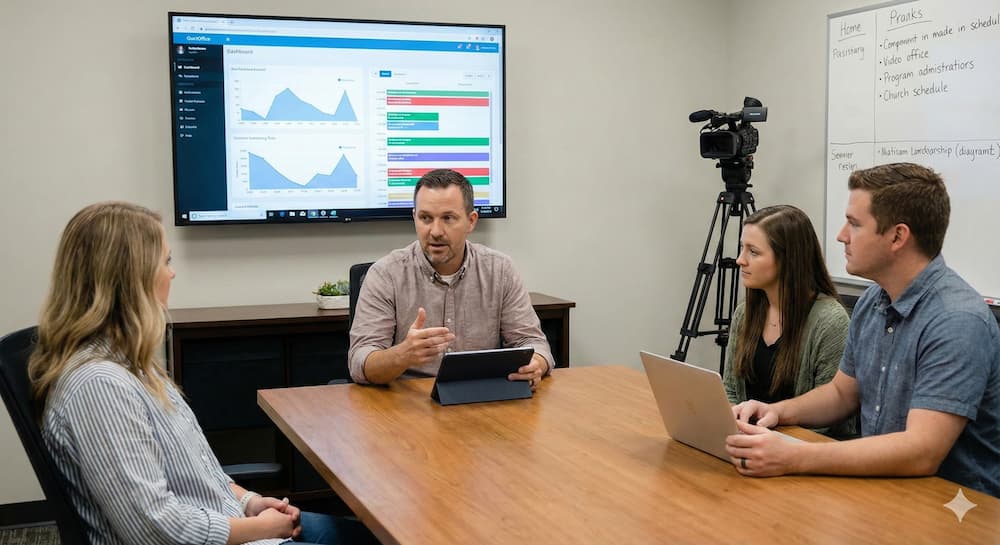Pastoral Care in Your Inbox: How Personalized Email Outreach Nurtures Church Members
Churches can leverage technology to extend pastoral care, connect with members through personalized email outreach, and reach new audiences online.

The way we connect and communicate has dramatically transformed–even in the Church.
The early Church didn’t have the option to instantly send messages and communicate with their brothers and sisters in Christ. Instead, they relied on letters (which we’re certainly thankful for, as they make up the majority of the New Testament.)
But here’s the thing: God can (and does) work through new technology!
While face-to-face interaction can never truly be replaced, it’s quite possible to reach people for Jesus, provide a sense of community, teach God’s word, and even do pastoral ministry online.
For churches, this shift presents an opportunity to extend pastoral care beyond traditional methods, embracing innovative tools like personalized email outreach. This approach not only enhances communication but also supports church members in meaningful, Jesus-centered ways.
The Importance of Pastoral Care
Pastoral care is a cornerstone of church ministry, focusing on providing spiritual, emotional, and practical support to members. It involves walking alongside individuals in their faith journey, offering guidance, encouragement, and compassion rooted in God's love and verses such as Acts 20:28.
Traditionally, this care has been delivered through face-to-face interactions, phone calls, and home visits. While these methods remain vital, integrating personalized email outreach can complement and enhance pastoral care efforts.
God can (and does) work through new technology!
Personalized Email Outreach: A Modern Ministry Tool
Personalized email outreach allows church leaders to reach members more frequently and efficiently. It offers a direct line of communication that can be tailored to the needs of each recipient.
Here are several ways personalized email outreach nurtures church members:
Regular Spiritual Encouragement
Emails provide a platform for regularly sharing devotionals, scriptures from the Bible, and inspirational messages. These digital touchpoints can serve as daily or weekly reminders of God's presence and love, fostering spiritual growth and resilience.
Timely Support and Prayers
Life's challenges can arise unexpectedly, and personalized emails enable quick and timely support. Whether it's a prayer request, a word of encouragement from Jesus' teachings, or a reminder that the church community is there for them, emails ensure that members feel seen and supported during difficult times.
Celebrating Milestones and Achievements
Acknowledging significant events in members' lives—such as birthdays, anniversaries, or personal achievements—through personalized emails helps strengthen community bonds. It shows that the church cares about and celebrates the lives of its members, fostering a sense of belonging and appreciation.
Providing Resources and Updates
Emails are an effective way to share resources like sermon recordings, event invitations, and educational materials. This ensures that members stay informed and have access to valuable content that supports their spiritual journey and well-being.
Facilitating Two-Way Communication
Personalized email outreach isn't just about sending messages; it's also about listening. Encouraging members to respond with their thoughts, questions, or prayer requests fosters an interactive and engaging communication channel. This dialogue helps church leaders understand and address the unique needs of their congregation.
Enhancing Mental Health Support
Personalized emails can also serve as a medium for addressing mental health concerns. By providing information on available counseling services, referrals to mental health professionals, and offering prayers and encouragement, church leaders can play a crucial role in supporting the mental well-being of their members.
Promoting Engagement in Church Activities
Emails can be used to encourage participation in church activities and even sacraments for more liturgical churches. Personalized invitations to events, reminders about upcoming services, and updates on volunteer opportunities can help increase engagement and create a sense of community within the church. Just remember to include appropriate links and calls to action so that recipients know how to follow through on participation.
The Role of Church Leaders and Caregivers
Pastors, deacons, chaplains, and other church leaders play a crucial role in delivering personalized email outreach. Equipped with pastoral care training and grounded in the teachings of Christ, they can offer spiritual support and guidance that aligns with the mission of the church. Drawing on their knowledge of the Bible and their experiences in pastoral ministry, they can provide insights that resonate deeply with recipients.
Depending on the culture of your church and the style of communication, you’ll want to personalize pastoral care emails with a signature from a lead caregiver (such as a senior pastor.
Best Practices for Effective Email Outreach
To maximize the impact of personalized email outreach, consider the following best practices:
Segment Your Audience
Segmenting your email list allows you to send targeted messages that resonate with specific groups within your congregation. For example, emails to youth ministry members might differ in tone and content from those sent to senior members. Segmenting your audience is also a great way to make sure emails are sensitive and relevant.
Craft Meaningful and Relevant Content
Ensure that each email provides value. Whether it’s a heartfelt message, a resource link, or an invitation to an event, the content should be meaningful and relevant to the recipient’s spiritual journey and needs.
Personalize Beyond the Name
Personalization goes beyond addressing recipients by their first name. Reference past interactions, acknowledge their contributions, and tailor messages to their interests and needs. This deepens the sense of connection and care.
Maintain Consistency and Frequency
Consistent and regular communication helps build trust and keeps the church community engaged. Determine a frequency that works for your congregation and stick to it, whether it’s weekly, bi-weekly, or monthly.
Monitor and Adapt
Track the performance of your email campaigns by monitoring open rates, click-through rates, and responses. Use this data to refine your approach and better meet the needs of your congregation.
Over to You
Personalized email outreach can significantly improve how your church nurtures and supports its members. By leveraging email, you can provide timely spiritual encouragement, celebrate milestones, offer support during challenges, and facilitate meaningful communication anytime and anywhere. Personalized email outreach is especially ideal for members who are unable to attend church because of illness, work, or a change in location.
As you embrace this approach, remember that the heart of pastoral care remains the same: showing God's love and care to each member of your congregation, one email at a time. The heart of pastoral care is found in 2 Corinthians: Praise be to the God and Father of our Lord Jesus Christ, the Father of compassion and the God of all comfort, who comforts us in all our troubles, so that we can comfort those in any trouble with the comfort we ourselves receive from God. (2 Corinthians 1:3-4)
Just as the apostle Paul used letters to encourage and instruct the early Christians, modern church leaders can use emails to extend pastoral care services and spiritual guidance. Whether through sharing God’s word, offering pastoral counseling, or coordinating hospital visits and chaplaincy referrals, personalized email outreach can be a vital component of contemporary pastoral care practices.
By integrating clinical pastoral education and best practices from the pastoral care department, church leaders can ensure that their digital outreach is both effective and compassionate. This modern method of delivering pastoral care, rooted in the Latin word "pastor," meaning shepherd, continues the tradition of guiding and nurturing the flock with the love of Christ.
Sign Up for Product Updates
The way we connect and communicate has dramatically transformed–even in the Church.
The early Church didn’t have the option to instantly send messages and communicate with their brothers and sisters in Christ. Instead, they relied on letters (which we’re certainly thankful for, as they make up the majority of the New Testament.)
But here’s the thing: God can (and does) work through new technology!
While face-to-face interaction can never truly be replaced, it’s quite possible to reach people for Jesus, provide a sense of community, teach God’s word, and even do pastoral ministry online.
For churches, this shift presents an opportunity to extend pastoral care beyond traditional methods, embracing innovative tools like personalized email outreach. This approach not only enhances communication but also supports church members in meaningful, Jesus-centered ways.
The Importance of Pastoral Care
Pastoral care is a cornerstone of church ministry, focusing on providing spiritual, emotional, and practical support to members. It involves walking alongside individuals in their faith journey, offering guidance, encouragement, and compassion rooted in God's love and verses such as Acts 20:28.
Traditionally, this care has been delivered through face-to-face interactions, phone calls, and home visits. While these methods remain vital, integrating personalized email outreach can complement and enhance pastoral care efforts.
God can (and does) work through new technology!
Personalized Email Outreach: A Modern Ministry Tool
Personalized email outreach allows church leaders to reach members more frequently and efficiently. It offers a direct line of communication that can be tailored to the needs of each recipient.
Here are several ways personalized email outreach nurtures church members:
Regular Spiritual Encouragement
Emails provide a platform for regularly sharing devotionals, scriptures from the Bible, and inspirational messages. These digital touchpoints can serve as daily or weekly reminders of God's presence and love, fostering spiritual growth and resilience.
Timely Support and Prayers
Life's challenges can arise unexpectedly, and personalized emails enable quick and timely support. Whether it's a prayer request, a word of encouragement from Jesus' teachings, or a reminder that the church community is there for them, emails ensure that members feel seen and supported during difficult times.
Celebrating Milestones and Achievements
Acknowledging significant events in members' lives—such as birthdays, anniversaries, or personal achievements—through personalized emails helps strengthen community bonds. It shows that the church cares about and celebrates the lives of its members, fostering a sense of belonging and appreciation.
Providing Resources and Updates
Emails are an effective way to share resources like sermon recordings, event invitations, and educational materials. This ensures that members stay informed and have access to valuable content that supports their spiritual journey and well-being.
Facilitating Two-Way Communication
Personalized email outreach isn't just about sending messages; it's also about listening. Encouraging members to respond with their thoughts, questions, or prayer requests fosters an interactive and engaging communication channel. This dialogue helps church leaders understand and address the unique needs of their congregation.
Enhancing Mental Health Support
Personalized emails can also serve as a medium for addressing mental health concerns. By providing information on available counseling services, referrals to mental health professionals, and offering prayers and encouragement, church leaders can play a crucial role in supporting the mental well-being of their members.
Promoting Engagement in Church Activities
Emails can be used to encourage participation in church activities and even sacraments for more liturgical churches. Personalized invitations to events, reminders about upcoming services, and updates on volunteer opportunities can help increase engagement and create a sense of community within the church. Just remember to include appropriate links and calls to action so that recipients know how to follow through on participation.
The Role of Church Leaders and Caregivers
Pastors, deacons, chaplains, and other church leaders play a crucial role in delivering personalized email outreach. Equipped with pastoral care training and grounded in the teachings of Christ, they can offer spiritual support and guidance that aligns with the mission of the church. Drawing on their knowledge of the Bible and their experiences in pastoral ministry, they can provide insights that resonate deeply with recipients.
Depending on the culture of your church and the style of communication, you’ll want to personalize pastoral care emails with a signature from a lead caregiver (such as a senior pastor.
Best Practices for Effective Email Outreach
To maximize the impact of personalized email outreach, consider the following best practices:
Segment Your Audience
Segmenting your email list allows you to send targeted messages that resonate with specific groups within your congregation. For example, emails to youth ministry members might differ in tone and content from those sent to senior members. Segmenting your audience is also a great way to make sure emails are sensitive and relevant.
Craft Meaningful and Relevant Content
Ensure that each email provides value. Whether it’s a heartfelt message, a resource link, or an invitation to an event, the content should be meaningful and relevant to the recipient’s spiritual journey and needs.
Personalize Beyond the Name
Personalization goes beyond addressing recipients by their first name. Reference past interactions, acknowledge their contributions, and tailor messages to their interests and needs. This deepens the sense of connection and care.
Maintain Consistency and Frequency
Consistent and regular communication helps build trust and keeps the church community engaged. Determine a frequency that works for your congregation and stick to it, whether it’s weekly, bi-weekly, or monthly.
Monitor and Adapt
Track the performance of your email campaigns by monitoring open rates, click-through rates, and responses. Use this data to refine your approach and better meet the needs of your congregation.
Over to You
Personalized email outreach can significantly improve how your church nurtures and supports its members. By leveraging email, you can provide timely spiritual encouragement, celebrate milestones, offer support during challenges, and facilitate meaningful communication anytime and anywhere. Personalized email outreach is especially ideal for members who are unable to attend church because of illness, work, or a change in location.
As you embrace this approach, remember that the heart of pastoral care remains the same: showing God's love and care to each member of your congregation, one email at a time. The heart of pastoral care is found in 2 Corinthians: Praise be to the God and Father of our Lord Jesus Christ, the Father of compassion and the God of all comfort, who comforts us in all our troubles, so that we can comfort those in any trouble with the comfort we ourselves receive from God. (2 Corinthians 1:3-4)
Just as the apostle Paul used letters to encourage and instruct the early Christians, modern church leaders can use emails to extend pastoral care services and spiritual guidance. Whether through sharing God’s word, offering pastoral counseling, or coordinating hospital visits and chaplaincy referrals, personalized email outreach can be a vital component of contemporary pastoral care practices.
By integrating clinical pastoral education and best practices from the pastoral care department, church leaders can ensure that their digital outreach is both effective and compassionate. This modern method of delivering pastoral care, rooted in the Latin word "pastor," meaning shepherd, continues the tradition of guiding and nurturing the flock with the love of Christ.
podcast transcript
The way we connect and communicate has dramatically transformed–even in the Church.
The early Church didn’t have the option to instantly send messages and communicate with their brothers and sisters in Christ. Instead, they relied on letters (which we’re certainly thankful for, as they make up the majority of the New Testament.)
But here’s the thing: God can (and does) work through new technology!
While face-to-face interaction can never truly be replaced, it’s quite possible to reach people for Jesus, provide a sense of community, teach God’s word, and even do pastoral ministry online.
For churches, this shift presents an opportunity to extend pastoral care beyond traditional methods, embracing innovative tools like personalized email outreach. This approach not only enhances communication but also supports church members in meaningful, Jesus-centered ways.
The Importance of Pastoral Care
Pastoral care is a cornerstone of church ministry, focusing on providing spiritual, emotional, and practical support to members. It involves walking alongside individuals in their faith journey, offering guidance, encouragement, and compassion rooted in God's love and verses such as Acts 20:28.
Traditionally, this care has been delivered through face-to-face interactions, phone calls, and home visits. While these methods remain vital, integrating personalized email outreach can complement and enhance pastoral care efforts.
God can (and does) work through new technology!
Personalized Email Outreach: A Modern Ministry Tool
Personalized email outreach allows church leaders to reach members more frequently and efficiently. It offers a direct line of communication that can be tailored to the needs of each recipient.
Here are several ways personalized email outreach nurtures church members:
Regular Spiritual Encouragement
Emails provide a platform for regularly sharing devotionals, scriptures from the Bible, and inspirational messages. These digital touchpoints can serve as daily or weekly reminders of God's presence and love, fostering spiritual growth and resilience.
Timely Support and Prayers
Life's challenges can arise unexpectedly, and personalized emails enable quick and timely support. Whether it's a prayer request, a word of encouragement from Jesus' teachings, or a reminder that the church community is there for them, emails ensure that members feel seen and supported during difficult times.
Celebrating Milestones and Achievements
Acknowledging significant events in members' lives—such as birthdays, anniversaries, or personal achievements—through personalized emails helps strengthen community bonds. It shows that the church cares about and celebrates the lives of its members, fostering a sense of belonging and appreciation.
Providing Resources and Updates
Emails are an effective way to share resources like sermon recordings, event invitations, and educational materials. This ensures that members stay informed and have access to valuable content that supports their spiritual journey and well-being.
Facilitating Two-Way Communication
Personalized email outreach isn't just about sending messages; it's also about listening. Encouraging members to respond with their thoughts, questions, or prayer requests fosters an interactive and engaging communication channel. This dialogue helps church leaders understand and address the unique needs of their congregation.
Enhancing Mental Health Support
Personalized emails can also serve as a medium for addressing mental health concerns. By providing information on available counseling services, referrals to mental health professionals, and offering prayers and encouragement, church leaders can play a crucial role in supporting the mental well-being of their members.
Promoting Engagement in Church Activities
Emails can be used to encourage participation in church activities and even sacraments for more liturgical churches. Personalized invitations to events, reminders about upcoming services, and updates on volunteer opportunities can help increase engagement and create a sense of community within the church. Just remember to include appropriate links and calls to action so that recipients know how to follow through on participation.
The Role of Church Leaders and Caregivers
Pastors, deacons, chaplains, and other church leaders play a crucial role in delivering personalized email outreach. Equipped with pastoral care training and grounded in the teachings of Christ, they can offer spiritual support and guidance that aligns with the mission of the church. Drawing on their knowledge of the Bible and their experiences in pastoral ministry, they can provide insights that resonate deeply with recipients.
Depending on the culture of your church and the style of communication, you’ll want to personalize pastoral care emails with a signature from a lead caregiver (such as a senior pastor.
Best Practices for Effective Email Outreach
To maximize the impact of personalized email outreach, consider the following best practices:
Segment Your Audience
Segmenting your email list allows you to send targeted messages that resonate with specific groups within your congregation. For example, emails to youth ministry members might differ in tone and content from those sent to senior members. Segmenting your audience is also a great way to make sure emails are sensitive and relevant.
Craft Meaningful and Relevant Content
Ensure that each email provides value. Whether it’s a heartfelt message, a resource link, or an invitation to an event, the content should be meaningful and relevant to the recipient’s spiritual journey and needs.
Personalize Beyond the Name
Personalization goes beyond addressing recipients by their first name. Reference past interactions, acknowledge their contributions, and tailor messages to their interests and needs. This deepens the sense of connection and care.
Maintain Consistency and Frequency
Consistent and regular communication helps build trust and keeps the church community engaged. Determine a frequency that works for your congregation and stick to it, whether it’s weekly, bi-weekly, or monthly.
Monitor and Adapt
Track the performance of your email campaigns by monitoring open rates, click-through rates, and responses. Use this data to refine your approach and better meet the needs of your congregation.
Over to You
Personalized email outreach can significantly improve how your church nurtures and supports its members. By leveraging email, you can provide timely spiritual encouragement, celebrate milestones, offer support during challenges, and facilitate meaningful communication anytime and anywhere. Personalized email outreach is especially ideal for members who are unable to attend church because of illness, work, or a change in location.
As you embrace this approach, remember that the heart of pastoral care remains the same: showing God's love and care to each member of your congregation, one email at a time. The heart of pastoral care is found in 2 Corinthians: Praise be to the God and Father of our Lord Jesus Christ, the Father of compassion and the God of all comfort, who comforts us in all our troubles, so that we can comfort those in any trouble with the comfort we ourselves receive from God. (2 Corinthians 1:3-4)
Just as the apostle Paul used letters to encourage and instruct the early Christians, modern church leaders can use emails to extend pastoral care services and spiritual guidance. Whether through sharing God’s word, offering pastoral counseling, or coordinating hospital visits and chaplaincy referrals, personalized email outreach can be a vital component of contemporary pastoral care practices.
By integrating clinical pastoral education and best practices from the pastoral care department, church leaders can ensure that their digital outreach is both effective and compassionate. This modern method of delivering pastoral care, rooted in the Latin word "pastor," meaning shepherd, continues the tradition of guiding and nurturing the flock with the love of Christ.
VIDEO transcript
The way we connect and communicate has dramatically transformed–even in the Church.
The early Church didn’t have the option to instantly send messages and communicate with their brothers and sisters in Christ. Instead, they relied on letters (which we’re certainly thankful for, as they make up the majority of the New Testament.)
But here’s the thing: God can (and does) work through new technology!
While face-to-face interaction can never truly be replaced, it’s quite possible to reach people for Jesus, provide a sense of community, teach God’s word, and even do pastoral ministry online.
For churches, this shift presents an opportunity to extend pastoral care beyond traditional methods, embracing innovative tools like personalized email outreach. This approach not only enhances communication but also supports church members in meaningful, Jesus-centered ways.
The Importance of Pastoral Care
Pastoral care is a cornerstone of church ministry, focusing on providing spiritual, emotional, and practical support to members. It involves walking alongside individuals in their faith journey, offering guidance, encouragement, and compassion rooted in God's love and verses such as Acts 20:28.
Traditionally, this care has been delivered through face-to-face interactions, phone calls, and home visits. While these methods remain vital, integrating personalized email outreach can complement and enhance pastoral care efforts.
God can (and does) work through new technology!
Personalized Email Outreach: A Modern Ministry Tool
Personalized email outreach allows church leaders to reach members more frequently and efficiently. It offers a direct line of communication that can be tailored to the needs of each recipient.
Here are several ways personalized email outreach nurtures church members:
Regular Spiritual Encouragement
Emails provide a platform for regularly sharing devotionals, scriptures from the Bible, and inspirational messages. These digital touchpoints can serve as daily or weekly reminders of God's presence and love, fostering spiritual growth and resilience.
Timely Support and Prayers
Life's challenges can arise unexpectedly, and personalized emails enable quick and timely support. Whether it's a prayer request, a word of encouragement from Jesus' teachings, or a reminder that the church community is there for them, emails ensure that members feel seen and supported during difficult times.
Celebrating Milestones and Achievements
Acknowledging significant events in members' lives—such as birthdays, anniversaries, or personal achievements—through personalized emails helps strengthen community bonds. It shows that the church cares about and celebrates the lives of its members, fostering a sense of belonging and appreciation.
Providing Resources and Updates
Emails are an effective way to share resources like sermon recordings, event invitations, and educational materials. This ensures that members stay informed and have access to valuable content that supports their spiritual journey and well-being.
Facilitating Two-Way Communication
Personalized email outreach isn't just about sending messages; it's also about listening. Encouraging members to respond with their thoughts, questions, or prayer requests fosters an interactive and engaging communication channel. This dialogue helps church leaders understand and address the unique needs of their congregation.
Enhancing Mental Health Support
Personalized emails can also serve as a medium for addressing mental health concerns. By providing information on available counseling services, referrals to mental health professionals, and offering prayers and encouragement, church leaders can play a crucial role in supporting the mental well-being of their members.
Promoting Engagement in Church Activities
Emails can be used to encourage participation in church activities and even sacraments for more liturgical churches. Personalized invitations to events, reminders about upcoming services, and updates on volunteer opportunities can help increase engagement and create a sense of community within the church. Just remember to include appropriate links and calls to action so that recipients know how to follow through on participation.
The Role of Church Leaders and Caregivers
Pastors, deacons, chaplains, and other church leaders play a crucial role in delivering personalized email outreach. Equipped with pastoral care training and grounded in the teachings of Christ, they can offer spiritual support and guidance that aligns with the mission of the church. Drawing on their knowledge of the Bible and their experiences in pastoral ministry, they can provide insights that resonate deeply with recipients.
Depending on the culture of your church and the style of communication, you’ll want to personalize pastoral care emails with a signature from a lead caregiver (such as a senior pastor.
Best Practices for Effective Email Outreach
To maximize the impact of personalized email outreach, consider the following best practices:
Segment Your Audience
Segmenting your email list allows you to send targeted messages that resonate with specific groups within your congregation. For example, emails to youth ministry members might differ in tone and content from those sent to senior members. Segmenting your audience is also a great way to make sure emails are sensitive and relevant.
Craft Meaningful and Relevant Content
Ensure that each email provides value. Whether it’s a heartfelt message, a resource link, or an invitation to an event, the content should be meaningful and relevant to the recipient’s spiritual journey and needs.
Personalize Beyond the Name
Personalization goes beyond addressing recipients by their first name. Reference past interactions, acknowledge their contributions, and tailor messages to their interests and needs. This deepens the sense of connection and care.
Maintain Consistency and Frequency
Consistent and regular communication helps build trust and keeps the church community engaged. Determine a frequency that works for your congregation and stick to it, whether it’s weekly, bi-weekly, or monthly.
Monitor and Adapt
Track the performance of your email campaigns by monitoring open rates, click-through rates, and responses. Use this data to refine your approach and better meet the needs of your congregation.
Over to You
Personalized email outreach can significantly improve how your church nurtures and supports its members. By leveraging email, you can provide timely spiritual encouragement, celebrate milestones, offer support during challenges, and facilitate meaningful communication anytime and anywhere. Personalized email outreach is especially ideal for members who are unable to attend church because of illness, work, or a change in location.
As you embrace this approach, remember that the heart of pastoral care remains the same: showing God's love and care to each member of your congregation, one email at a time. The heart of pastoral care is found in 2 Corinthians: Praise be to the God and Father of our Lord Jesus Christ, the Father of compassion and the God of all comfort, who comforts us in all our troubles, so that we can comfort those in any trouble with the comfort we ourselves receive from God. (2 Corinthians 1:3-4)
Just as the apostle Paul used letters to encourage and instruct the early Christians, modern church leaders can use emails to extend pastoral care services and spiritual guidance. Whether through sharing God’s word, offering pastoral counseling, or coordinating hospital visits and chaplaincy referrals, personalized email outreach can be a vital component of contemporary pastoral care practices.
By integrating clinical pastoral education and best practices from the pastoral care department, church leaders can ensure that their digital outreach is both effective and compassionate. This modern method of delivering pastoral care, rooted in the Latin word "pastor," meaning shepherd, continues the tradition of guiding and nurturing the flock with the love of Christ.




























